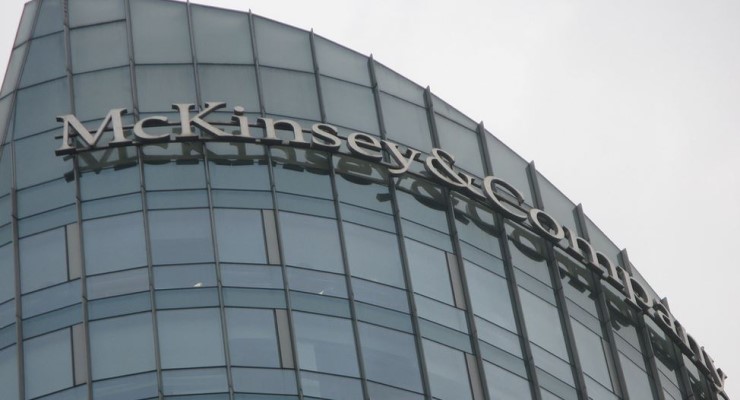
Who’s winning the battle to mop up the taxpayer gravy left by PwC’s ignominious exit from consulting in Canberra?
In the first of a monthly series, we’ll be looking at what AusTender tells us about consulting contracts being let by Commonwealth agencies to determine who’s enjoying taxpayer largesse for powerpoint presentations, economic modelling, risk management analyses and consultation management strategies.
As the end of the financial year loomed, Deloitte was the overall winner in June, with $2.6 million in consulting contracts and another $1.5 million for internal audit services for the Future Fund. Among Deloitte’s contract was more than half a million dollars to develop “a monitoring and reporting framework for the national women’s health strategy” for the Department of Health, the sort of thing that used to be boilerplate public service work before the Howard government decided evaluation of its programs might prove too embarrassing and departments en masse stopped trying to determine whether spending actually achieved anything.
Second was KPMG, with $4.2 million in consulting contracts, including $1 million for a three-year actuarial services contract for Comcover, $600,000 from health to “support the delivery of the national health and climate strategy”, and $945,000 to review defence’s internal budget (to be fair, given the defence budget is the fiscal equivalent of the Augean stables, $1 million to review it is probably fair enough).
Next was McKinsey, which proved pound-for-pound the heaviest-hitting consultant. In June it received just three contracts, but all were more than $1 million each, for a total of $4.1 million — two at Treasury and one at health, a $1.7 million contract for “consultancy services advice and modelling”.
That contract is for modelling for the government’s 60-day prescription reform announced in the budget. According to a health spokesperson, it “separately engaged McKinsey & Company and the Centre for Health Economics Research and Evaluation (CHERE), from the University of Technology Sydney, to provide independent advice on the modelling undertaken by the department’s subject matter experts on these topics. Specifically, McKinsey will provide independent insights on international dispensing experience, plus develop further models to assess financial, and supply and demand impacts of the 60-day dispensing policy”.
Health says McKinsey was engaged through the Department of Finance’s Management Advisory Services Panel.
And, fair enough, McKinsey does indeed have international dispensing experience — just ask US congressional committee chair Carolyn Maloney, who last year described McKinsey as playing a “central role in driving a public health crisis that has killed half a million Americans and continues to claim tens of thousands of lives every year”.
Her committee released a report on how McKinsey had worked to “turbocharge” opioid prescriptions in the US — while simultaneously working with the Food and Drug Administration (FDA) on how to curb opioid use (and in turn telling opioid manufacturers it should hire McKinsey because it knew how to get around FDA attempts to curb opioid use).
A bipartisan law has since been passed in the US to ban consultants from doing what McKinsey did.
The New York Times found that in over a decade’s worth of work for opioid manufacturers Mallinckrodt, Purdue and Endo, McKinsey advised Endo to invest in a massive sales push for the super-powerful opioid Opana even after research had revealed links with serious disease, “profiled and targeted physicians, in some instances trying to influence prescribing habits in ways that federal officials later warned heightened the risk of overdose”, and then, as authorities began trying to address the opioid epidemic, advised on how to maintain sales.
Last year it settled a lawsuit brought by state attorneys-general for US$570 million, and was forced to apologise, saying: “We recognise the terrible consequences of the opioid epidemic and have acknowledged our role in serving opioid manufacturers.”
So who better than McKinsey to advise the Health Department on prescription, particularly when it comes to pain relief? According to the department’s response to Crikey, the company’s “central” role in the deaths of hundreds of thousands of Americans wasn’t considered in selecting it.
Health had a wonderful month when it came to handing out money to disgraced consultants. On June 13 it revealed it was handing $64,200 for “provision of project management services” to PwC, one of the few contracts anyone in the Commonwealth has given the soon-to-be-jettisoned consulting arm of the tax leak perpetrators.
But at least no-one died as a result of the leak.








Please correct me but wasn’t it the Public Service people who took policies from the government of the day and did the hard yards, researching and consulting without having to hand over millions to outsiders? Wasn’t that the PS employees job?
Yep, they actually took the ideas and brain-farts and turned them into Policies. Then did the further hard yards ……
putting one jobs provider on $ 58 million capital ( one director) for 7 thousand unemployed in 2021-22=rip off
Give these departments heads a present – a book by Walt Bogdanich and Michael Forsythe called When McKinsey Comes to Town. They will dare not engage McKinsey after reading that book.
Thank you for this Bernard. The destruction of the Aus Public Service is the single worst thing the LNP has landed us with. It has made corruption easier, and deprived Australians of sound, disinterested policy implementation. Simply disgraceful all round.
should be sued petsonally for serious malfeasance
Any chance of putting Howard in jail? The amount of damage he did will be calculated one day. It must be in the trillions.
This is sickening and nobody is pushing back against this. Thanks for bringing this to our attention. Now, if only I could freely share this article to my friends who are not Crikey subscribers, that would help bring it much needed public attention.
Cut, paste, and email.
At the top of this, and all articles, opposite the byline, is a ‘give this article’ link. Use that..